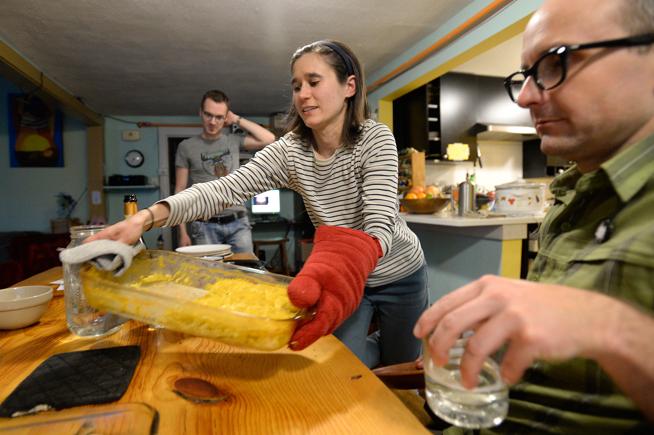
Alana Wilson, center, serves dinner at the Boulder Housing Coalition’s Chrysalis Co-Op in Boulder last week. (Jeremy Papasso / Daily Camera Staff Photographer)
By Stephen Sparn and Adrian Sopher
Better Boulder supports enabling responsible housing cooperatives in Boulder. We believe co-ops have a modest but worthwhile part to play in meeting Boulder’s affordable housing and sustainability goals.
Housing co-ops are shared homes in which a group of people choose to operate as a collaborative household. Co-op members share household expenses for things like food, rent, and utilities, and organize themselves to cook meals, clean, maintain the property and provide childcare. In order to ensure the household functions smoothly, co-ops have explicit group decision-making processes and house rules.
Housing cooperatives are nothing new to Boulder. The three legal, permanently affordable co-ops owned by the Boulder Housing Coalition have existed for more than 30 years combined. Other cities have cooperative networks; some dating back to the Great Depression. The Madison Community Cooperative, which provides broader community housing, is a good example of what we might see in Boulder if we enable housing co-ops.
Perhaps uniquely, by sharing resources housing cooperatives can create affordability with or without public subsidy, and without requiring new construction, enabling vital members of our community to live and work in town without commuting. In many ways, the sharing that happens in a cooperative home embodies the reasons Better Boulder supports sustainable urbanism: more shared infrastructure means fewer resources used per person. Data collected by the Boulder Community Housing Association suggest that existing Boulder co-ops use between a quarter and a third as much electricity, natural gas, and water per person as the Colorado average.
We support enabling several different types of cooperatives. Organized co-op households should be able to rent from a private landlord (rental co-ops), non-profits should be allowed own the property on behalf co-op members (group equity co-ops), and residents should be able to share ownership of their home (private equity co-ops). Cooperatives that are owned by residents, or by a non-profit organization must have the right to reside in the home for the long term. Stability is one of the main reasons people choose to buy rather than rent their homes. Co-op members should enjoy the same security in this regard as other homeowners, even if the enabling legislation is someday repealed.
If neighbors have concerns about potential impacts from a nearby cooperative, Better Boulder believes that those impacts should be addressed directly through enforcement of existing ordinances governing noise and appropriate property maintenance, rather than indirectly through restrictions on what kinds of consensual living arrangements are allowed within a household. For things like increased traffic and reduced on-street parking availability, we may need to develop new tools to mitigate neighborhood impacts. At the same time, we must remain cognizant of the fact that our streets are public rights of way, held in the public trust for all users. If neighborhood parking requires management, we would prefer that the management scheme apply equitably to all users of our streets. Allowing more people to share housing almost certainly reduces total traffic impacts significantly, as it will allow more people to live closer to where they work, rather than having to commute in.
Because the proposed ordinance limits the number of co-ops that can be created each year, it seems very unlikely that they will have any appreciable effect on overall housing valuations. Giving rental co-op groups as much bargaining power as possible will protect them from price gouging, and help mitigate any market impacts.
Boulder has a long history of regulating with possible negative impacts in mind, often to the point of precluding positive outcomes, as happened with the original ordinance supposedly enabling co-ops 20 years ago, and with our current policies around accessory dwelling units. We think it’s time for a different tack: Boulder needs to experiment a little, especially with housing policy. We should be willing to try new policies out, learning from them and refining them if there are unintended consequences.
Within their niche, housing cooperatives can serve the city’s affordable housing and sustainability goals extremely well, but they are not likely to be a broad solution. Looking forward, it’s important to remember that there are thousands of less well organized Boulder residents living in violation of the city’s occupancy limits. Many of them are good neighbors. Those who cannot afford to live in Boulder without sharing housing do not deserve to live in fear of losing their housing. We hope that enabling housing cooperatives will be a positive first step toward regulating external impacts rather than the types of living arrangements that exist within a private home.
Stephen Sparn and Adrian Sopher are members of the Better Boulder steering committee.
